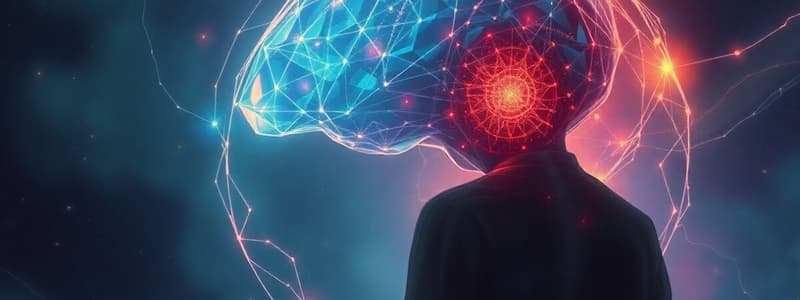Podcast
Questions and Answers
What is characterized by the repression of sexual interests and the development of social and intellectual skills?
What is characterized by the repression of sexual interests and the development of social and intellectual skills?
- Genital Stage
- Psychoanalytic Stage
- Latency Period (correct)
- Infancy Period
According to Freud's theories, which factor is commonly overlooked in his psychoanalytic perspective?
According to Freud's theories, which factor is commonly overlooked in his psychoanalytic perspective?
- Gender differences
- Biological influences
- Childhood experiences
- Sociocultural factors (correct)
What concept refers to the belief in one's own abilities as emphasized in Social Cognitive Theory?
What concept refers to the belief in one's own abilities as emphasized in Social Cognitive Theory?
- Locus of control
- Self-efficacy (correct)
- Observational learning
- Reciprocal determinism
Which Neofreudian emphasized the importance of social connections and feelings of inferiority?
Which Neofreudian emphasized the importance of social connections and feelings of inferiority?
Which of the following is NOT one of the Big Five Personality Factors?
Which of the following is NOT one of the Big Five Personality Factors?
What methodology does Walter Mischel advocate for in personality assessment?
What methodology does Walter Mischel advocate for in personality assessment?
Which of the following best describes the term 'archetypes' in Carl Jung's theory?
Which of the following best describes the term 'archetypes' in Carl Jung's theory?
What is a characteristic of self-report inventories in personality assessment?
What is a characteristic of self-report inventories in personality assessment?
What is the primary focus of psychodynamic therapy?
What is the primary focus of psychodynamic therapy?
Which of the following describes systematic desensitization?
Which of the following describes systematic desensitization?
In cognitive behavioral therapy, what is the ABC approach primarily concerned with?
In cognitive behavioral therapy, what is the ABC approach primarily concerned with?
What does the term 'deindividuation' refer to in social behavior?
What does the term 'deindividuation' refer to in social behavior?
What is a key characteristic of client-centered therapy as developed by Carl Rogers?
What is a key characteristic of client-centered therapy as developed by Carl Rogers?
In Milgram's study on obedience, what percentage of participants completed the entire shock regimen?
In Milgram's study on obedience, what percentage of participants completed the entire shock regimen?
Which therapy technique involves learning new responses to previously conditioned stimuli?
Which therapy technique involves learning new responses to previously conditioned stimuli?
What does 'group think' impede in group decision-making?
What does 'group think' impede in group decision-making?
Aggression that is motivated by feelings and intended to inflict pain is known as what type of aggression?
Aggression that is motivated by feelings and intended to inflict pain is known as what type of aggression?
What is the primary goal of altruism in social behavior?
What is the primary goal of altruism in social behavior?
What is a common method used in projective tests for assessing personality?
What is a common method used in projective tests for assessing personality?
Which of the following accurately describes a characteristic of anxiety disorders?
Which of the following accurately describes a characteristic of anxiety disorders?
What is a major concern raised about the DSM?
What is a major concern raised about the DSM?
Which of the following is NOT a characteristic of mood disorders?
Which of the following is NOT a characteristic of mood disorders?
Which of the following best describes the term 'insanity' in a legal context?
Which of the following best describes the term 'insanity' in a legal context?
What factor is typically excluded when considering the causes of psychological disorders?
What factor is typically excluded when considering the causes of psychological disorders?
What characteristic defines Body Dysmorphic Disorder?
What characteristic defines Body Dysmorphic Disorder?
In terms of prevalence rates, which of the following anxiety disorders has the highest prevalence?
In terms of prevalence rates, which of the following anxiety disorders has the highest prevalence?
What is a potential cause of Post Traumatic Stress Disorder (PTSD)?
What is a potential cause of Post Traumatic Stress Disorder (PTSD)?
What is the primary focus of the biopsychosocial model?
What is the primary focus of the biopsychosocial model?
Which of the following is a symptom of Major Depressive Disorder?
Which of the following is a symptom of Major Depressive Disorder?
Antisocial Personality Disorder is distinguished by which of the following traits?
Antisocial Personality Disorder is distinguished by which of the following traits?
What best describes the term 'dissociative identity disorder' (DID)?
What best describes the term 'dissociative identity disorder' (DID)?
What psychological component most strongly relates to the development of Bipolar Disorder?
What psychological component most strongly relates to the development of Bipolar Disorder?
Flashcards
Latency Period
Latency Period
Ages 6 to puberty, where sexual interests are repressed, and social/intellectual skills develop.
Genital Stage
Genital Stage
Puberty to adulthood, characterized by sexual reawakening and seeking romantic/sexual relationships outside the family.
Inferiority Complex
Inferiority Complex
Exaggerated feelings of inadequacy; striving to overcome feelings of being less able than others.
Self-efficacy
Self-efficacy
Signup and view all the flashcards
Reciprocal Determinism
Reciprocal Determinism
Signup and view all the flashcards
Collective Unconscious
Collective Unconscious
Signup and view all the flashcards
Self-actualization
Self-actualization
Signup and view all the flashcards
Situationism
Situationism
Signup and view all the flashcards
Psychotherapy
Psychotherapy
Signup and view all the flashcards
Psychodynamic Approach
Psychodynamic Approach
Signup and view all the flashcards
Classical Conditioning
Classical Conditioning
Signup and view all the flashcards
Counterconditioning
Counterconditioning
Signup and view all the flashcards
Operant Conditioning Therapies
Operant Conditioning Therapies
Signup and view all the flashcards
Cognitive Behavioral Therapy (CBT)
Cognitive Behavioral Therapy (CBT)
Signup and view all the flashcards
Client-centered therapy
Client-centered therapy
Signup and view all the flashcards
Groupthink
Groupthink
Signup and view all the flashcards
Social Identity Theory
Social Identity Theory
Signup and view all the flashcards
Aggression
Aggression
Signup and view all the flashcards
Psychological Disorder
Psychological Disorder
Signup and view all the flashcards
DSM-5
DSM-5
Signup and view all the flashcards
Specific Phobia
Specific Phobia
Signup and view all the flashcards
Social Anxiety Disorder
Social Anxiety Disorder
Signup and view all the flashcards
Panic Disorder
Panic Disorder
Signup and view all the flashcards
Generalized Anxiety Disorder
Generalized Anxiety Disorder
Signup and view all the flashcards
Obsessive-Compulsive Disorder (OCD)
Obsessive-Compulsive Disorder (OCD)
Signup and view all the flashcards
Major Depressive Disorder
Major Depressive Disorder
Signup and view all the flashcards
Bipolar Disorder
Bipolar Disorder
Signup and view all the flashcards
Schizophrenia
Schizophrenia
Signup and view all the flashcards
Dissociative Identity Disorder (DID)
Dissociative Identity Disorder (DID)
Signup and view all the flashcards
Antisocial Personality Disorder
Antisocial Personality Disorder
Signup and view all the flashcards
Projective Tests
Projective Tests
Signup and view all the flashcards
Minnesota Multiphasic Personality Inventory (MMPI-2)
Minnesota Multiphasic Personality Inventory (MMPI-2)
Signup and view all the flashcards
NEO-PI-R
NEO-PI-R
Signup and view all the flashcards
Study Notes
Freud's Psychoanalytic Perspective
- Freud's theory features stages of psychosexual development, with the Oedipus complex emerging during the phallic stage.
- Issues with Freud's theory include vagueness, untestability, overemphasis on sex, and neglect of social and later-life factors.
Neo-Freudian Perspectives
- Alfred Adler: Individual psychology emphasizes compensation for perceived inferiority, forming the inferiority complex. Social connections and birth order are crucial.
- Erik Erikson: Developed eight psychosocial stages of development across the lifespan.
- Carl Jung: Proposed a collective unconscious shared by all humans, encompassing archetypes (universal themes).
- Karen Horney: Focused on social factors, addressing gender bias and emphasizing the need for security.
Social Cognitive Theory
- Albert Bandura: Highlights reciprocal determinism (interaction between personality and environment) and observational learning (acquiring behaviors through observation). Self-efficacy is essential.
- Julian Rotter: Introduced the concept of locus of control (belief about personal power over life events).
Situationism and Personality
- Walter Mischel: Emphasizes situational influences on personality (situationism). Self-regulation, exemplified by the marshmallow test, is relevant.
Humanistic Approach to Personality
- Abraham Maslow: Emphasizes self-actualization (reaching full potential).
- Carl Rogers: Focuses on self-concept, conditions of worth, and the distinction between the real-self and ideal-self.
Biological Approach to Personality
- Minnesota twin studies indicate significant genetic influence on personality. Neurotransmitters play a role (e.g., dopamine and extraversion).
Trait Theories of Personality
- Gordon Allport: Identified three trait categories: cardinal, central, and secondary.
- Raymond Cattell: Argued traits exist on a continuum.
- Hans and Sybil Eysenck: Proposed two personality dimensions: extraversion/introversion and neuroticism/stability.
- Big Five Factors: Five key dimensions of personality (openness, conscientiousness, extroversion, agreeableness, neuroticism).
Personality Assessment: Self-Report Inventories and Projective Tests
- Self-report inventories (e.g., NEO-PI-R, MMPI-2) measure personality using self-reported responses.
- Projective tests (e.g., Rorschach, TAT) utilize ambiguous stimuli to infer personality attributes.
Psychological Disorders: Definition, Classification, and Causes
- Psychological disorders are characterized by abnormal thoughts, feelings, and behaviors, often influenced by cultural contexts.
- The DSM-5, is a primary diagnostic tool for classifying psychological disorders.
- Causes of disorders involve complex interplay of biological, psychological, and sociocultural influences (biopsychosocial model).
Anxiety Disorders
- Anxiety disorders feature excessive and persistent fear and anxiety, differing substantially from normal anxiety.
- Specific phobia: Excessive fear of a particular object or situation.
- Social anxiety disorder: Persistent fear of social situations.
- Panic disorder: Reccuring panic attacks.
- Generalized anxiety disorder: Chronic, excessive anxiety.
- Obsessive-compulsive disorder (OCD): Intrusive thoughts (obsessions) and repetitive behaviors (compulsions).
Other Anxiety, Mood, and Dissociative Disorders
- Body dysmorphic disorder: Preoccupation with perceived physical flaws.
- Hoarding disorder: Excessive accumulation of items.
- PTSD: Reaction to a traumatic event characterized by flashbacks, avoidance, and hyperarousal.
- Mood disorders (depressive and bipolar): Severe disturbances in mood.
- Major depressive disorder: Prolonged sadness without mania.
- Persistent depressive disorder: Chronic low mood.
- Bipolar disorder: Alternating periods of depression and mania.
- Schizophrenia: Severe disruptions in cognitive thought/perception.
- Dissociative identity disorder (DID): Presence of two or more distinct personalities.
Personality Disorders
- Personality disorders represent enduring, maladaptive personality patterns that significantly impact social functioning. Examples include Borderline Personality Disorder, and Antisocial Personality Disorder.
Treatment Approaches
- Psychotherapy aims to improve personal well-being and address problems.
- Different approaches include psychodynamic, behavioral, cognitive, humanistic, and integrative therapies.
Social Psychology
- Group psychology: Topics include conformity, risky-shift, groupthink, group polarization, social facilitation, social loafing, deindividuation, and social contagion.
- Intergroup relations: Explores prejudice, aggression, and altruism among groups and individuals.
- Social identity theory: Emphasizes the role of ingroups and outgroups in self-image.
Studying That Suits You
Use AI to generate personalized quizzes and flashcards to suit your learning preferences.
Description
Explore Freud's psychosexual development theory along with Neo-Freudian perspectives from Adler, Erikson, Jung, and Horney. The quiz covers key concepts like the Oedipus complex, inferiority complex, psychosocial stages, and social cognitive theory. Test your understanding of these foundational ideas in psychology.




